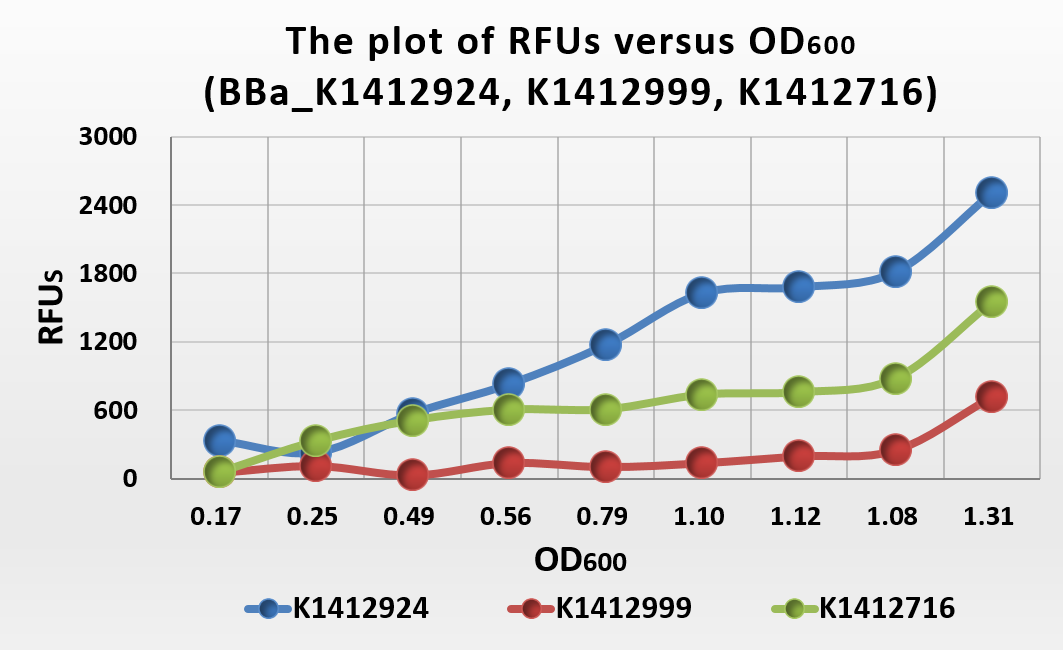Part:BBa_K1412924:Experience
This experience page is provided so that any user may enter their experience using this part.
Please enter
how you used this part and how it worked out.
Applications of BBa_K1412924
User Reviews
UNIQ4e7588c94b880b96-partinfo-00000000-QINU
|
•••••
iGEM2014 [http://2014.igem.org/Team:XMU-China# XMU-China] |
iGEM2014 [http://2014.igem.org/Team:XMU-China# XMU-China] has sequenced this device. The following data was taken from this device. |
|
•••••
|
Experimental dataVerificationFigure 1. Enzyme digestion verification of devices BBa_J23101 + BBa_E0240(BBa_K1412924)1. 100bp Marker; 2. BBa_K1412924 with double enzymes ([http://en.wikipedia.org/wiki/Restriction_enzyme Xba I] and [http://en.wikipedia.org/wiki/Restriction_enzyme Pst I]) digestion; 3. 1kb Marker. As double restriction enzyme digestion generates two target segments, we confirm that device BBa_J23101 + BBa_E0240 is constructed correctly because of the fragment near 1000 bp. Figure 2. GFP of different device1: BBa_K1412999 in DH5α; 2: BBa_K1412716 in DH5α; 3: BBa_K1412716 (reconstructed by [http://2014.igem.org/Team:XMU-China# XMU-China]) in DH5α; 4: BBa_K1412924 in DH5α. The bacteria was cultured in the LB medium for 12 hrs at 37℃ shaking at 200 rpm in the table concentrator, then 1 ml bacterium solution was transferred into 1.5 ml centrifuge tube, and was centrifuged at 10000 rcf(g) for 1 min. The supernatant was discarded and the residuals was suspend by [http://en.wikipedia.org/wiki/Phosphate_buffered_saline PBS]. The solution was centrifuged again, and we got the bacteria precipitate as the picture shown in Figure 2. In which we can find that device BBa_K1412924 is greenish in natural light while device BBa_K1412716 (reconstructed by [http://2014.igem.org/Team:XMU-China# XMU-China]) and BBa_K1412716 emit a canary yellow color, and device BBa_K1412999 show the color which is close to white. Figure 3. GFP of different device under the UV-light1: BBa_K1412924 in DH5α; 2: BBa_K1412716 (reconstructed by [http://2014.igem.org/Team:XMU-China# XMU-China]) in DH5α; 3: BBa_K1412716 in DH5α; 4: BBa_K1412999 in DH5α. Under UV-light, the bacterium precipitate above can be observed clearly that device BBa_K1412924 can emit strong green fluorescence, while devices BBa_K1412716 (reconstructed by [http://2014.igem.org/Team:XMU-China# XMU-China]) and BBa_K1412716 have weaker green fluorescence, and the green fluorescence from device BBa_K1412999 is the weakest so that we can’t even observe a green pixel. MeasurementFigure 4. The plot of optical density versus timeFrom the plot of optical density versus time, we can conclude that the growth rate of bacteria is become lower with time. We measured the samples three times parallelly, and we can know that the reproducibility of the data is acceptable. When we compare it with BBa_K1412716 and BBa_K1412999, we can get that their growth rate are almost equal. Figure 5. The plot of RFUs versus timeFrom the plot of RFUs(relative fluorescent units) versus time, we can conclude that RFUs grow linearly with time. When we compare it with BBa_K1412716 and BBa_K1412999, we can get that the fluoresent expression intensity of BBa_K1412924 is higher than BBa_K1412716 and BBa_K1412999. Figure 6. The plot of RFUs versus OD600From the plot of RFUs versus OD600, we can conclude that RFUs grow linearly with OD600. Because the fluoresent protein expression of each bateria is contain, so when the concentration of bacteria increase, the fluoresent expression increase too. When we compare it with BBa_K1412716 and BBa_K1412999, we can get that the fluoresent expression intensity of BBa_K1412924 is higher than BBa_K1412716 and BBa_K1412999. Figure 7. The plot of RFUs/OD600 versus timeFrom the plot of RFUs/OD600 versus time, we know the RFUs/OD600 is a representation of the fluoresent expression intensity of unit bacteria. So we can get that the fluoresent expression intensity of BBa_K1412924 is higher than BBa_K1412716 and BBa_K1412999. Protocol1. Transformed BBa_K1412924 into DH5α competent cells, coated plates, grown in incubator for 12 hrs at 37℃. 2. Inoculate a 5 ml cultures of supplemented LB medium and antibiotic (Chloromycetin 50 μg/ml) with single colony from the plate. 3. Cultures were grown in conical flask for 16 hrs at 37℃ with shaking at 200 rpm in the table concentrator. 4. Cultures were diluted 1:100 into three 20 ml fresh LB medium and grown for 3 hrs at 37℃ with shaking at 200 rpm in the table concentrator. 5. Then transfered 650 μl of the culture to a 1.5 ml centrifuge tube, centrifuged and washed twice with phosphate-buffered saline ([http://en.wikipedia.org/wiki/Phosphate_buffered_saline PBS], pH 7.4) to minimize the background fluorescence from the medium. 6. The washed cells were suspended in [http://en.wikipedia.org/wiki/Phosphate_buffered_saline PBS] and diluted to bring the cells into an appropriate concentration range (2–5 times) before taking fluorimeter measurements. 7. Measure the fluorescence and absorbance: (1)Fluorescence:
(2)OD600 (optical density at 600 nm):
8. Measure every 30 minutes in the next 4 hrs. References[1] [http://journals.aps.org/pre/abstract/10.1103/PhysRevE.82.021911 Bagh, Sangram, Mahuya Mandal, and David R. McMillen. "Minimal genetic device with multiple tunable functions." Physical Review E 82.2 (2010): 021911].
|











